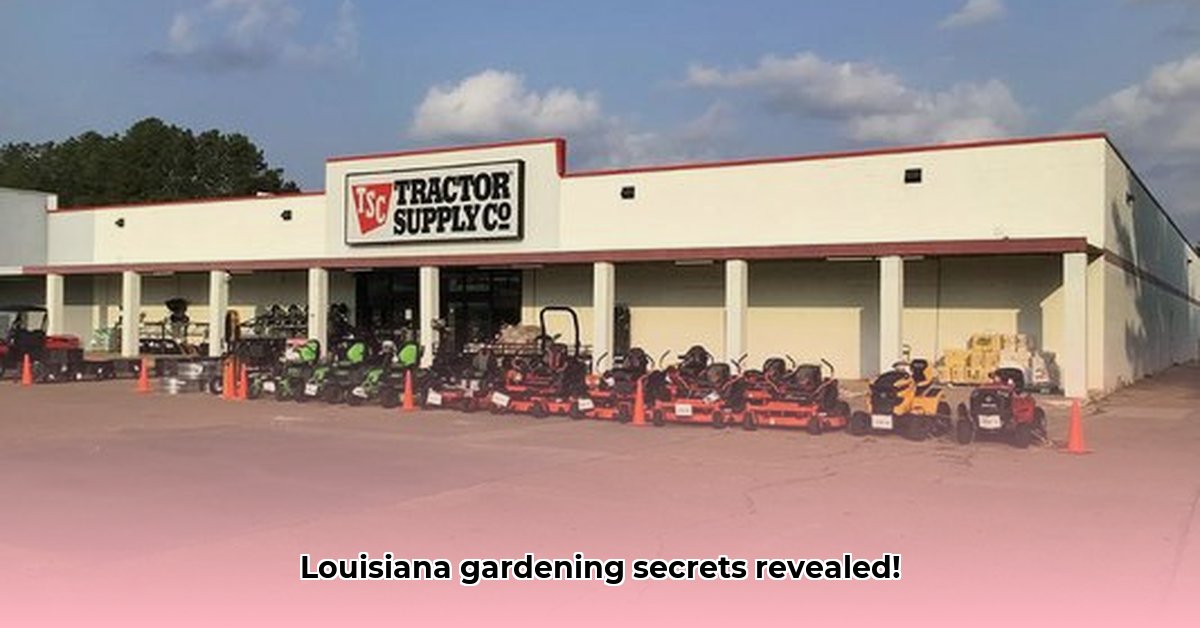
Tractor Supply Mansfield Louisiana: A Quiet Force in Sustainable Agriculture
Tractor Supply Company (TSC) in Mansfield, Louisiana, may seem like an unlikely champion of sustainable agriculture. Yet, this unassuming retail giant plays a surprisingly crucial role in supporting eco-friendly practices within the community, from backyard vegetable patches to small-scale farms. While not explicitly advertising itself as a purveyor of only sustainable products, its offerings frequently support the broader goals of ecological responsibility. For more information on TSC's garden supplies, check out this helpful guide. How does this seemingly ordinary store contribute to a greener Louisiana?
The answer lies in the everyday needs of local gardeners and farmers. A home gardener starting a small plot needs seeds, soil, and tools—all readily available at TSC. Similarly, a farmer raising chickens sustainably requires feed, fencing, and water troughs—items easily found on the TSC shelves. This seemingly ordinary transaction has wider implications––it's a quiet, yet powerful, contribution to a network of sustainable efforts across the Mansfield community, influencing gardening and farming practices at various scales.
This impact extends across different groups. Small-scale farmers utilize TSC for supplies that facilitate responsible livestock management, potentially leading to reduced environmental impact. Backyard gardeners find resources allowing them to cultivate thriving gardens that rely less on chemical fertilizers and pesticides, nurturing healthier soil and encouraging natural plant growth. Even the pet food sold at TSC, while requiring further investigation into sourcing and production, contributes indirectly to sustainable practices depending on the ingredients used. How can we be certain? While more research is crucial to fully analyze the broader impact, a review of TSC's product range indicates a growing segment of both organic and sustainably-sourced items.
Reliable fencing, for instance, helps keep animals contained, minimizing escapes and preventing environmental damage. High-quality seeds promote biodiversity and create resilient crops, less susceptible to disease. The availability of water troughs and efficient irrigation systems encourages responsible water management—a cornerstone of environmentally friendly agriculture. Each individual item, seemingly mundane on its own, contributes to a larger picture of sustainable practices when considered in aggregate.
However, TSC's role isn't without room for improvement. Greater transparency regarding product origins would significantly enhance its sustainability profile. Clear labels indicating whether products meet environmental certifications would empower eco-conscious consumers to make informed choices. Similarly, a public assessment of the environmental footprint of their products would highlight their dedication to continuous improvement. A concerted effort to expand the range of sustainably produced goods would further solidify their commitment to fostering eco-friendly practices and meeting growing consumer demand.
But the journey towards sustainability isn't solely reliant on TSC. Consumers must actively choose eco-friendly products and educate themselves on sustainable practices. Local and state governments can further incentivize sustainable farming and responsible land management through beneficial policies. It's a collaborative effort, requiring active participation from all stakeholders.
Key Takeaways:
- TSC in Mansfield plays a vital, albeit indirect, role in supporting sustainable agriculture within the community.
- The availability of everyday supplies, from seeds to fencing, empowers both small-scale farmers and home gardeners to adopt greener practices.
- Increased transparency and a larger selection of certified sustainable products would further strengthen TSC’s contribution to a more environmentally conscious agricultural landscape.
How to Source Sustainable Farming Supplies from Tractor Supply: A Step-by-Step Guide
Want to cultivate a flourishing, eco-friendly garden? Let's explore how to harness the resources available at your local Tractor Supply Company. While not a dedicated "organic-only" store, TSC offers various products that support sustainable gardening and farming practices.
Define Your Needs: Before heading to TSC, create a shopping list of specific supplies. This focused approach prevents impulse purchases that may not align with your sustainability goals. Do you need organic seeds for a vegetable patch, or eco-friendly pest control for established plants?
Look for Certifications: Prioritize products with reputable organic certifications (e.g., USDA Organic). These certifications guarantee that ingredients meet strict standards, ensuring reduced environmental impact from synthetic pesticides and fertilizers.
Examine Ingredient Lists: Carefully review product labels. Select those with natural ingredients that avoid harmful chemicals and genetically modified organisms (GMOs). Are your fertilizers derived from natural sources?
Engage with Staff: TSC employees possess invaluable knowledge of local conditions and product sourcing. Ask questions about organic seeds, natural fertilizers, or sustainable pest control options. Their expertise can guide you towards informed choices.
Consider Packaging: Opt for products with minimal or recycled packaging. This small act reduces waste and supports eco-conscious production methods.
Support Local Partnerships: Many TSC stores partner with local producers. Prioritizing these partnerships fosters community-based sustainability and minimizes transportation impact.
Explore Additional Options: TSC may not always stock everything needed. Research local suppliers or online retailers focused on organic and sustainable products to supplement your shopping.
The adoption of sustainable supplies leads to several benefits, including a reduced environmental impact, healthier produce, and enhanced support for environmentally responsible farming practices. However, challenges remain: the availability of fully organic products might be limited, and prices may be higher than conventional alternatives. Yet, even small steps towards sustainable sourcing contribute significantly to the larger goal of a greener future.